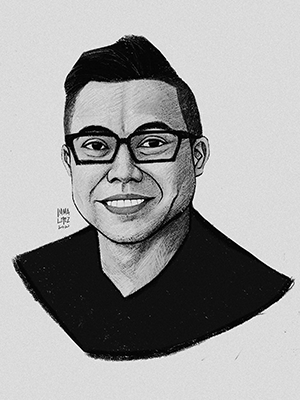After Anita Magsaysay-Ho’s Women with Baskets and Mangoes
Trinity of grace, they are the fruits swiveled from the branch, stillness and still life of summer’s inflorescence. They are the baskets they carry like a fretwork of memory, weaved story by story, morning after mourning. Their skin is the color of dried tobacco. Their headscarves are haloes. They are quiet as their labor of cleaning, mending, washing, mothering. They are echoes of each other’s gestures, and of the women before them, and of the first hand that plucked a fruit, achingly sweet and forbidden. They are harvesting.
After BenCab’s 32 Variations on Sabel
Your shadow meanders down the street where I seek you, silhouette volatile as water.
I think of you, a cipher contained in your cellophane dress, barefoot and bedraggled, seeding the air with your spells and gospels.
Our Lady of Detritus, you gather all that can be found, aware that the mouth wants more and more and more.
What are plastic bags and cardboard boxes if not artifacts?
You wear no mask, porous to the world. A storm runs its full course across your face.
Once, you were someone else: a daughter with a name, a mother, a wife, another life long ago.
Unfixed, you become as various as Hokusai’s views of Mount Fuji.
Say cleave, salvage, weather. Sabel, tell me about the dangers of language, how some words can shift meaning from one breath to the next.
All of your attention is distilled into a question: what can be fashioned out of an archive of loss?
O scavenger, wildling, nomad from heart to heart, you pass through each hour as if it were the last hour.
